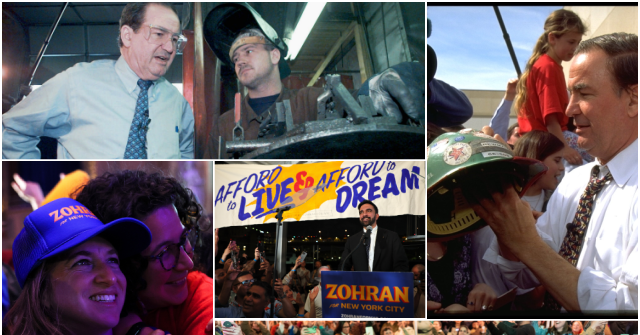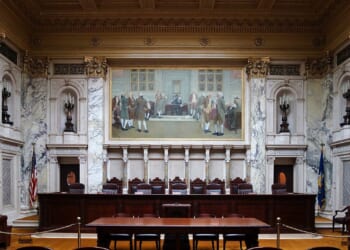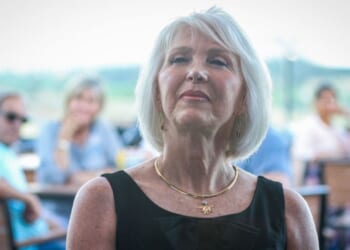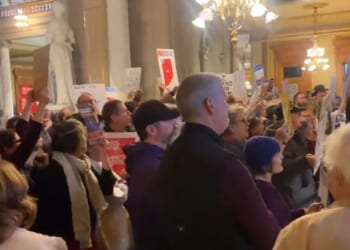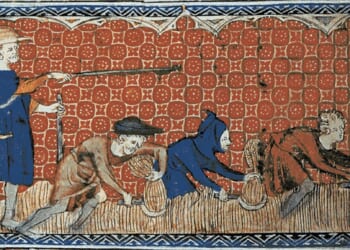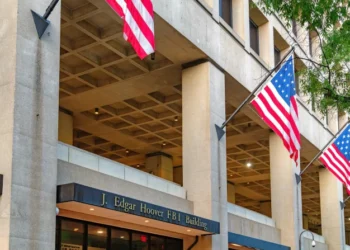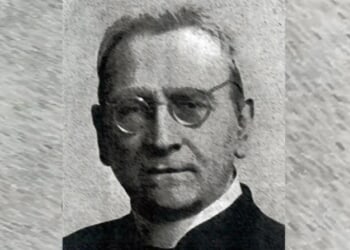The Professional Precariat Needs Populism Too
It’s a November morning in New Hampshire. Pat Buchanan is standing among the men and women of a footwear factory, listening to the assembly-line cobblers about the threats posed by cheap imported shoes to not only their jobs but their communities and their country.
It’s February afternoon in Iowa. Buchanan is in standing shin deep in the snow, learning from farmers how factory hog farming is destroying the first rung of the ladder of the agricultural economy.
It’s an early winter evening in Wheeling. The guys at the pub are trying to figure out what they will do when the smelter shuts down, never to be re-opened.
How could we lose? Surely America will see what’s coming? Surely conservatives and the Republican Party will embrace the cause of these Americans whose efforts defeated first fascism and then communism, only to be told now that the country they were defending is inevitably declining and some New World Order must take it place.
Then you think: maybe the bells are broken. Over and over again, you pull the damn rope and hardly anyone seems to hear. The sky just grows darker, the monster lurches forward, the ravens squawk into the dusk.
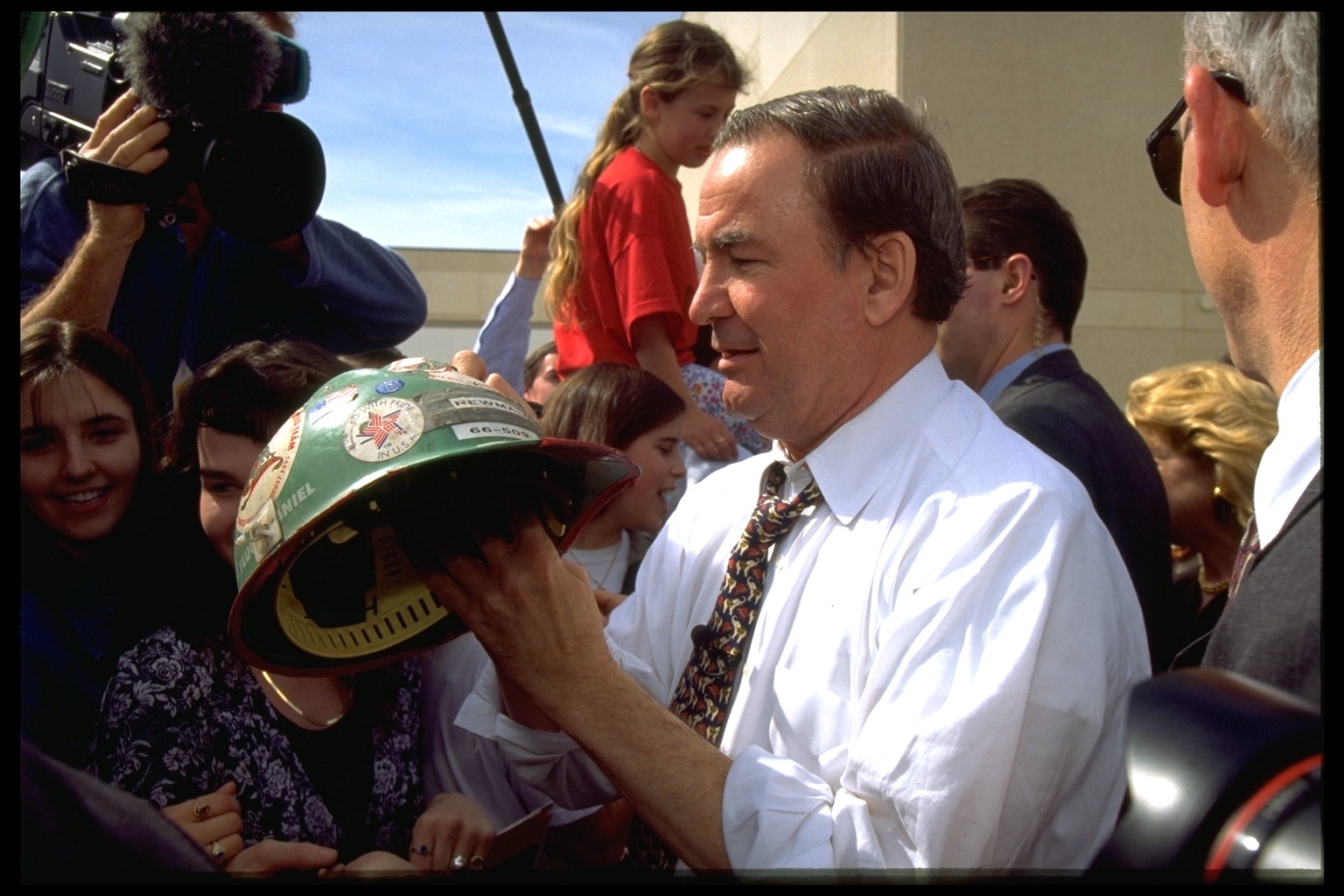
Republican presidential candidate Pat Buchanan signs a hard hat for a supporter at a campaign stop in Georgia in March 1996. (Rick Maiman/Sygma via Getty Images)
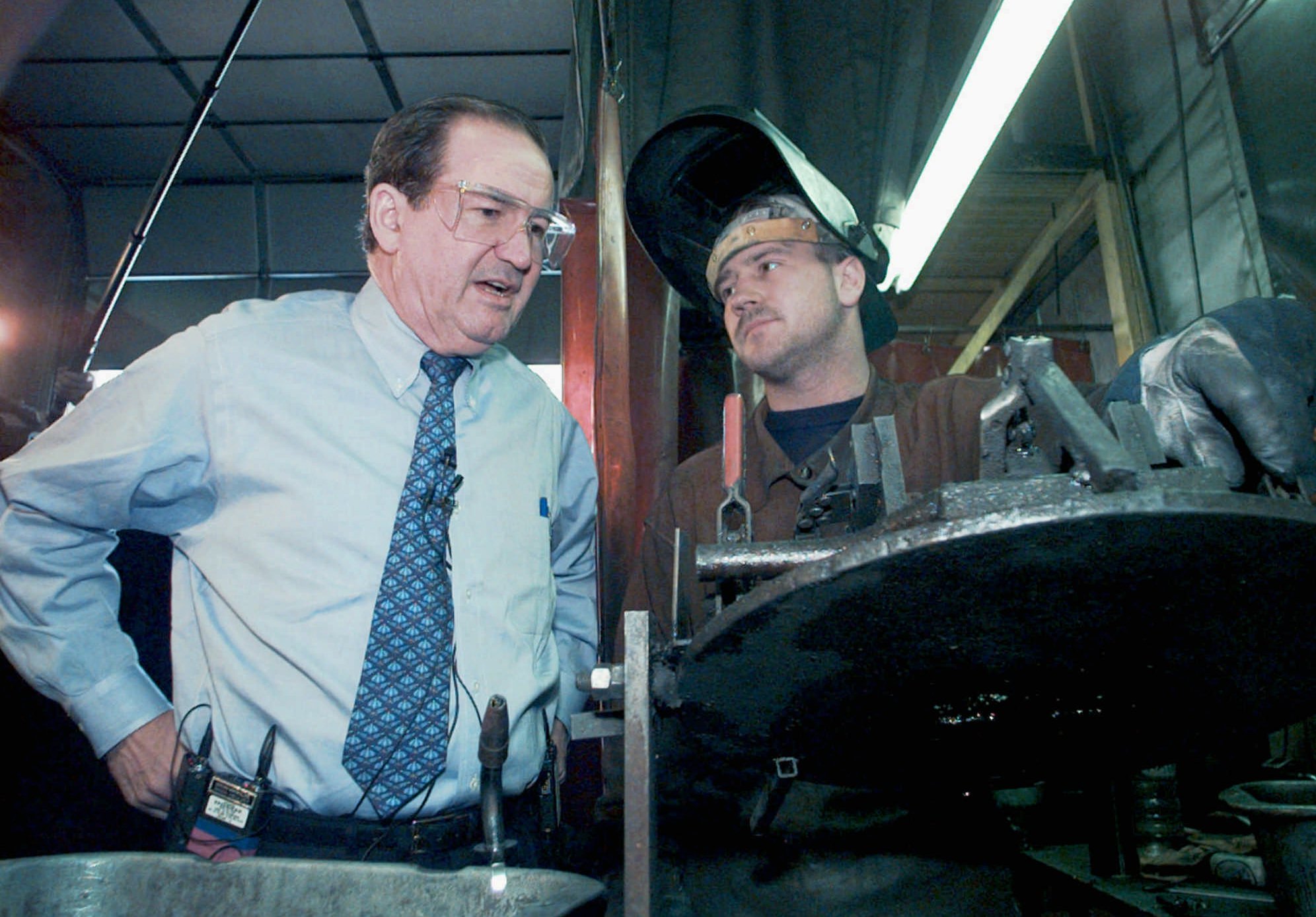
Republican presidential hopeful Pat Buchanan talks with plant worker William Bennett, 20, during a tour of Walt Industries, Harley Davidson Parts in Taylor, Michigan, on March 14, 1996. (AP Photo/Eric Draper)
It’s June in New York City. Nineteen years have passed. There’s a real estate developer coming down the escalator. He pulls the bell. It rings. You had thought maybe it just couldn’t ring anymore. But now you hear it again—and so do millions of Americans. The bells are ringing. You once again put on your coat, call up your friends. We can Make American Great Again.
The Bells Are Ringing for Me and My Gal
The bells are ringing in New York City again. They are chiming because of the election of Zohran Mamdani. The election of Zohran Mamdani should be a wake-up call for the American right.
We have spent years talking about the forgotten working class in deindustrialized towns. We’ve built an entire political identity around rejecting the establishment’s counsel of managed decline, the notion that America’s best days are behind us, that we should lower our expectations to match our diminished prospects, that we the best we can do is quietly shine the scraps of a perishing Republic.
So, when actual economic populism shows up in America’s largest city, when hundreds of thousands of people vote for radical change because they cannot afford a life, our instinct must not be to mock them as over-privileged whiners, champagne socialists, an intemperate TikTokelatriat. When we listen to the ”hot girls for Mamdani,” we should hear what they’re really saying: that they’ve been told to accept low wages in precarious work, bean burritos instead of Sunday dinners, cramped apartments instead of homes, a life of renting what their parents owned.
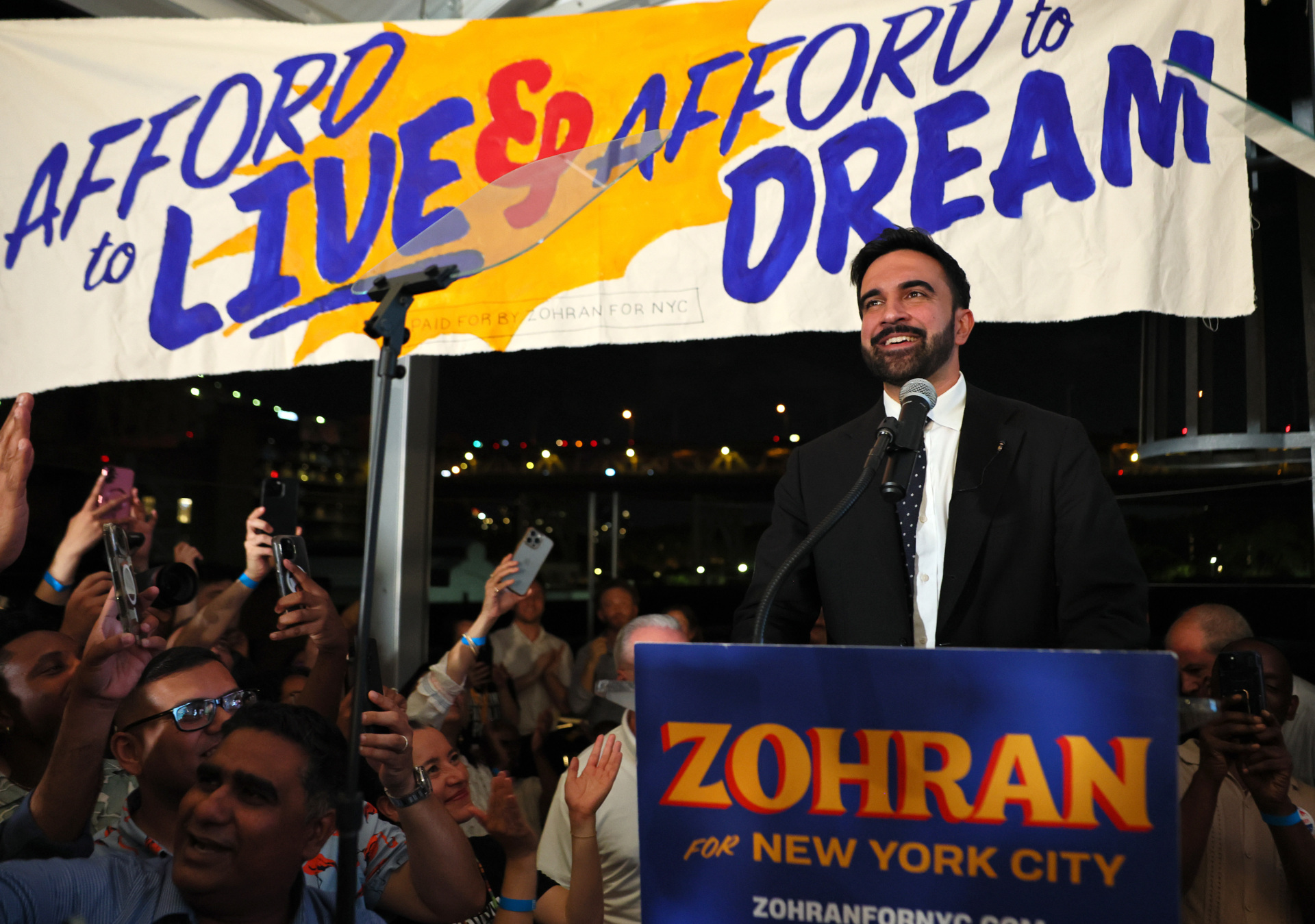
New York mayoral candidate Zohran Mamdani speaks to supporters during a primary election night gathering on June 24, 2025, in Queens. (Michael M. Santiago/Getty Images)
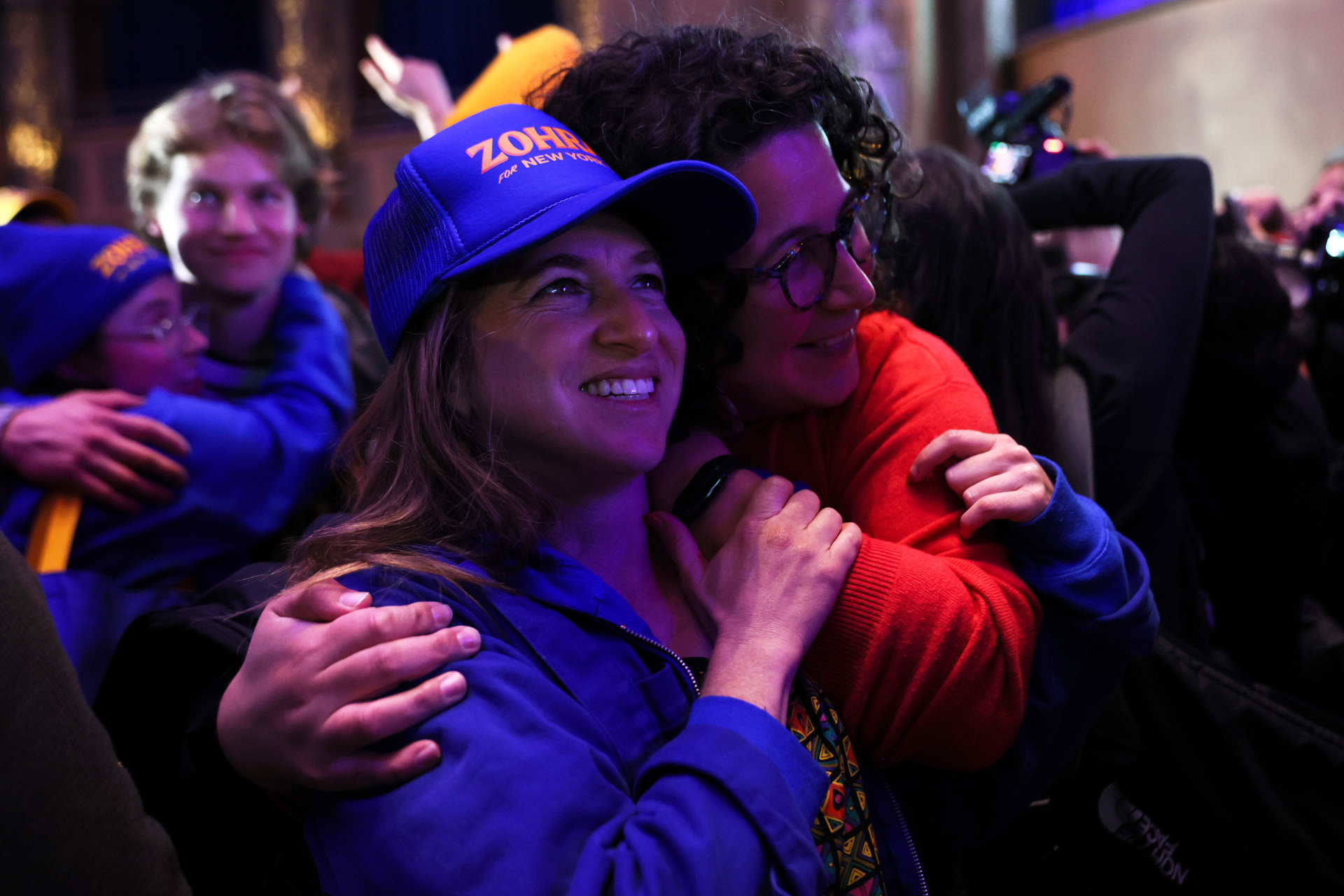
Supporters celebrate after New York City mayoral candidate Zohran Mamdani was projected the winner during his election night watch party on November 4, 2025, in Brooklyn. (Michael M. Santiago/Getty Images)
For supporters of the campaign to Make America Great Again to dismiss this is political self-harm. The professional middle class—credentialed workers who live on elite labor rather than capital—has been systematically squeezed over the past two decades. Their housing costs have exploded while their wages stagnated. Their job security evaporated while their credentials multiplied. Their path to wealth accumulation was blocked while they accumulated debt. Their work was outsourced to foreign staffing companies, their positions filled by workers with questionable visas.
Does this sound familiar? It should. What we’re witnessing in the professional class mirrors what happened to the steelworkers of West Virginia, the coal miners of Kentucky, and the machinists of Ohio. They’ve been radicalized not by ideology but by experience—by a political system that offers no solutions and insists their objections to decline are themselves illegitimate.
These professionals are not the enemy. They are the natural next chapter of the Make America Great Again coalition. The professional precariat is the Rust Belt of the third decade of the 21st century.
Remember our outrage when Kevin Williamson, then a writer at National Review, launched his infamous attack on the rust belt supporters of Trump—”Father Furher” in Williamson’s contemptuous phrase?
The white middle class may like the idea of Trump as a giant pulsing humanoid middle finger held up in the face of the Cathedral, they may sing hymns to Trump the destroyer and whisper darkly about “globalists” and — odious, stupid term — “the Establishment,” but nobody did this to them. They failed themselves.
[…]
Nothing happened to them. There wasn’t some awful disaster. There wasn’t a war or a famine or a plague or a foreign occupation. Even the economic changes of the past few decades do very little to explain the dysfunction and negligence — and the incomprehensible malice — of poor white America. So the gypsum business in Garbutt ain’t what it used to be. There is more to life in the 21st century than wallboard and cheap sentimentality about how the Man closed the factories down.
The truth about these dysfunctional, downscale communities is that they deserve to die. Economically, they are negative assets. Morally, they are indefensible…. What they need isn’t analgesics, literal or political. They need real opportunity, which means that they need real change, which means that they need U-Haul.”
David French, also of National Review at the time, rushed to Williamson’s defense: ”For generations, conservatives have rightly railed against deterministic progressive notions that put human choices at the mercy of race, class, history, or economics. Those factors can create additional challenges, but they do not relieve any human being of the moral obligation to do their best…Yet millions of Americans aren’t doing their best. Indeed, they’re barely trying.”
The irony is almost too perfect. Williamson’s original article was framed as an attack on Michael Brendan Dougherty, then a writer at The Week, and before that at The American Conservative, who has since joined the masthead of National Review—where he has proven to be one of the finest writers and thinkers in its 75-year history.
Williamson and French? They’ve had to pack their own metaphorical U-Hauls. French now pitches his tent on the opinion pages of the New York Times. Williamson writes for the Dispatch, that lonely outpost of Never Trump conservatism.
Make America’s Professional Class Great Again Too
What makes the disdainful reaction from some on the right particularly frustrating is that Mamdani’s supporters want things conservatives seek to defend. They want to own homes. They want to start families. They want stable communities. They want work that matters. These are not revolutionary demands. They’re the building blocks of a functional middle-class society.
Even some of these young women on TikTok jokingly announcing that New York City has become the Mamdani caliphate are really crying out for a city whose political and economic order reflects our moral instincts.

Supporters of New York City mayoral candidate Zohran Mamdani attend his election night watch party on November 4, 2025, in Brooklyn. (Andrew Lichtenstein/Corbis via Getty Images)
”Why do they insist on living in expensive metropolitan areas like New York City?” some conservatives ask. ”Why don’t they pack up the U-Haul and move somewhere more affordable?”
But this is the wrong question now—just as it was in 2016. The right question is: Why should we accept that life in our nation’s first capital has become inhospitable to educated young professionals? Why should we shrug when the opportunities offered to their parents’ and grandparents’ generations are closed to them? Why should we celebrate the transformation of America’s great cities into playgrounds for the global wealthy and deserts for everyone else?
At the very least, aren’t we owed an explanation for what we’re receiving in exchange for this transformation?
There is a policy agenda here for the taking: A pro-family housing platform that addresses urban affordability head-on. An economic and industrial policy that generates meaningful professional work beyond finance and consulting. A rethinking of how education debt warps every major life decision. Zoning reform that allows people to build homes and start businesses without begging permission from community boards for three years.
But you cannot get there if your first instinct is to dismiss everyone who voted for Mamdani as a coastal elite.
Which Way Is the Wind Blowing?
Mamdani’s election is not an isolated event. It is a call to attention. The question is: for whom is the bell tolling?
No matter what Mamdani himself might think, the election of 2025 was was not the beginning of a socialist uprising. The people who celebrated Mamdani’s victory on Tuesday night did not pour into the streets on Wednesday morning to liberate the means of production or drag the counter-revolutionaries to the guillotine. They woke up—perhaps slightly hungover, certainly exhausted—got dressed in work-appropriate outfits, ordered their coffee, took the subway, and went to their offices.
They went back to work.
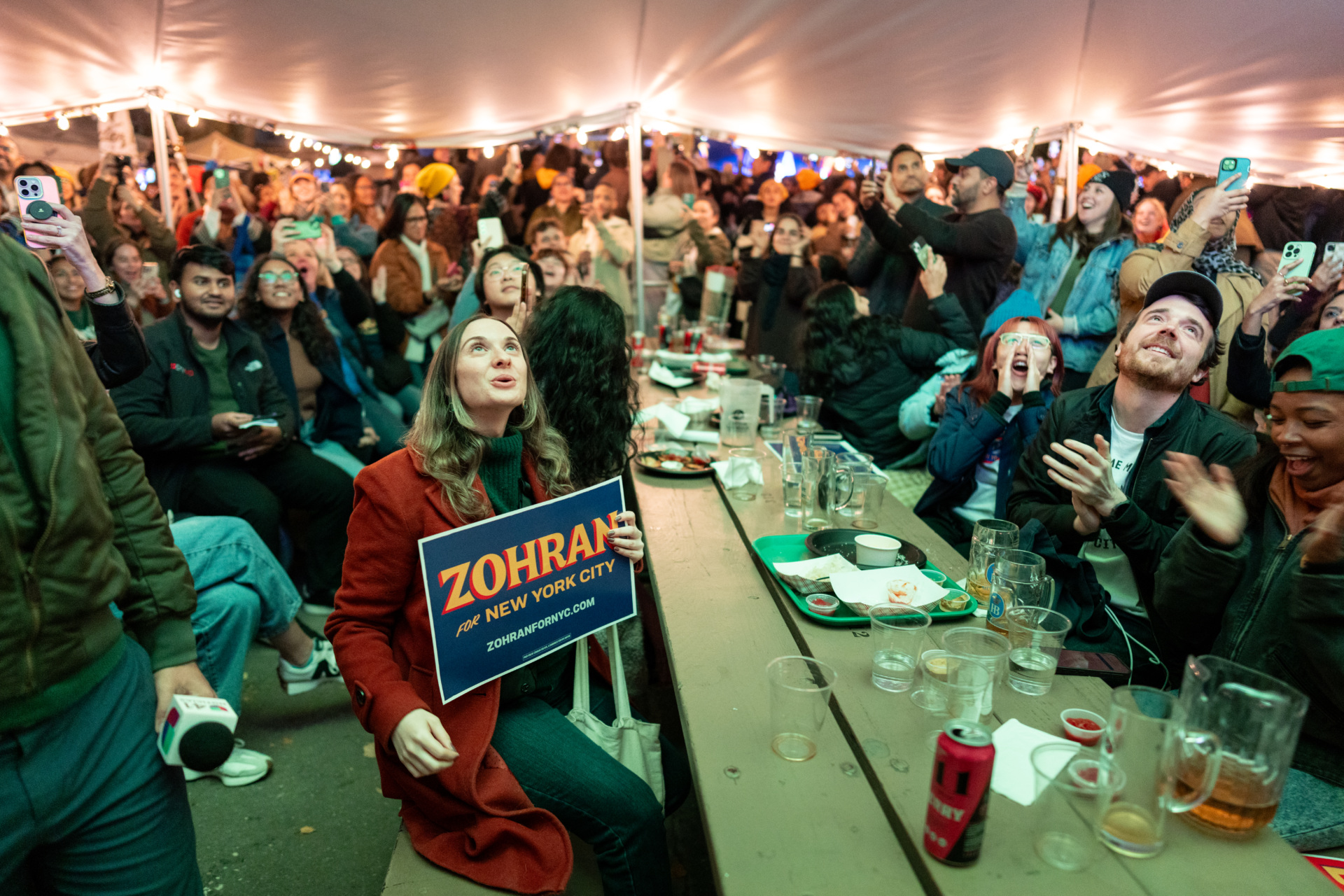
Supporters watch mayoral candidate Zohran Mamdani give his victory speech on television at an election-night watch party on November 4, 2025, in Queens. (Jeremy Weine/Getty Images)
What Tuesday represented was something more specific and potentially more durable than a revolutionary moment: the political mobilization of the professionally precarious, with just enough working-class support to win elections.
The conditions that produced Mamdani’s core coalition exist in every major American city. Housing unaffordability that makes family formation impossible. Public services and transportation that fail even the most basic expectations of safety and competency. The yawning gap between professional salaries and middle-class security.
The voters who delivered those stunning 60-70 point margins for Mamdani exist everywhere that educated workers have been systematically priced out of the American dream.
We suspect many of Mamdani’s plans will fail. Free buses might be fine—even good policy, honestly. Conservatives don’t need to become the scolding fare-collectors of public transportation. But city-owned grocery stores will never scale, persisting only as curiosities, taxpayer-funded museums that almost no one visits. Public schools will endure yet another well-intentioned reform that changes little. Universal free childcare will somehow sprout user fees or collapse into means-tested emergency programs. Five years from now, New York City will not be recognizably or particularly socialist.
But here’s what matters: Just as the Republican Party and the conservative movement underwent a transformation to champion America’s besieged industrial working class, we should now embrace the precarious professional class.
This may look far-fetched. But recall: not long ago, a GOP coalition of blue-collar factory workers seemed equally impossible. And it was not so distant a past when the forebears of many of these urban professionals—their parents, their grandparents—were Republicans, even conservatives.
Recognizing that another segment of the American economy is suffering under the current arrangement comes naturally to the right. We can defend the interests of hardworking people who earn good incomes but cannot afford the life they were promised. Who live one rent increase away from exile. Who delay or forgo children because space costs too much. Who followed every rule and discovered that the reward for obedience was permanent precarity.
These voters exist beyond New York’s five boroughs. They populate Austin and Seattle, Denver and Portland, Boston and San Francisco. They are renters with six-figure incomes and no path to ownership. They are parents in 900-square-foot apartments with one child and no room for a second. They are professionals who did everything right and discovered that right and wrong no longer determine outcomes.
Mamdani figured out how to speak to them, at least in New York. The Democratic establishment—even much of the traditional Democratic left—has nothing real to offer them beyond the same managed decline, the same narrowing horizons, the same advice to be grateful for less. How dare you want a dishwasher when the climate is changing?
The MAGA right can offer something different. Not an echo of the establishment’s diminished future, but a real choice. A real future.
It’s a chilly November evening in New York City. The young, heavily educated class has that same look in their eyes. The look you saw among the cobblers of New Hampshire, the farmers of Iowa, the steelworkers of Wheeling, the machinists of Ohio, and the autoworkers of Dearborn twenty-five years ago. They are crying out for help. Ringing the bell.
We can hear it again. Can you?

